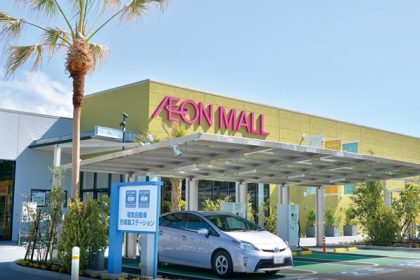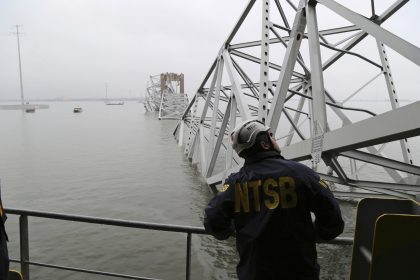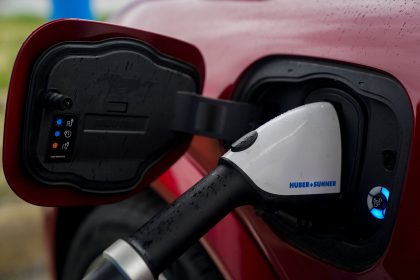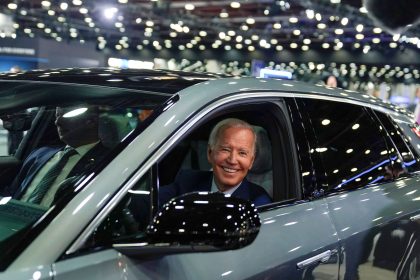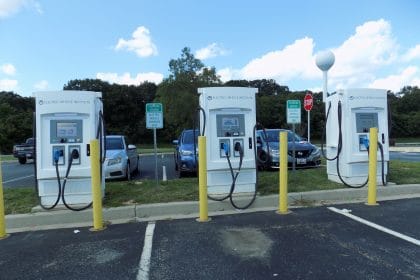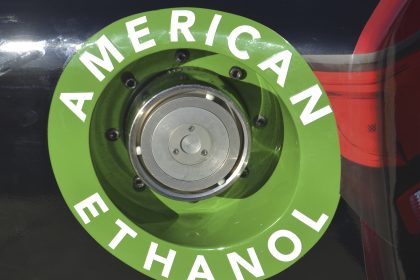Treasury Releases Long-Awaited Guidance on Clean Vehicle Credits

WASHINGTON — The Treasury Department on Friday released its long-awaited proposed guidance on which “clean” energy vehicles will be eligible for up to $7,500 in consumer tax credits.
The Notice of Proposed Rulemaking from the department and the Internal Revenue Service is set to be published in the Federal Register on April 17.
The proposed rule, which will be subject to a 60-day public comment period upon that date, is intended to provide “clarity and certainty” to manufacturers on the Inflation Reduction Act requirements for qualifying vehicles.
The first requirement is that the vehicles must undergo final assembly in North America and not exceed a Manufacturer’s Suggested Retail Price of $80,000 for a pickup truck, van or sport utility vehicle, or $55,000 for any other vehicle.
The proposed rule builds on that basic rule of thumb by setting forth proposed rules vehicles will have to meet in terms of sourcing of critical minerals and battery components contained within them.
Vehicles that meet one of the two proposed requirements will be eligible for a $3,750 credit, the department and IRS say.
In a written statement, Treasury Secretary Janet Yellen described Friday’s announcement as “an important step” that will ultimately help consumers save thousands of dollars when they buy a new clean energy vehicle and hundreds of dollars annually in defrayed gas purchases.
Critical Minerals
To meet the critical mineral requirement and be eligible for a $3,750 credit, an “applicable percentage of the value” of the critical minerals contained in the battery must be extracted or processed in the United States, a country with which the United States has a free trade agreement or be recycled in North America — as mandated by the Inflation Reduction Act.
For 2023, the applicable percentage is 40%.
For 2024, the applicable percentage is 50%.
For 2025, the applicable percentage is 60%.
For 2026, the applicable percentage is 70%.
Beginning in 2027, the applicable percentage is 80%.
The notice that will be published in the Federal Register proposes a three-step process for determining the percentage of the value of the critical minerals in a battery that contribute toward meeting critical minerals requirement:
- Determine procurement chains.
- Identify qualifying critical minerals.
- Calculate qualifying critical mineral content.
The notice also details a proposed set of principles for identifying the set of countries with which the United States has a free trade agreement in effect, since this term is not defined in statute. This term could include newly negotiated critical minerals agreements.
Agreements would be considered based on whether they reduce or eliminate trade barriers on a preferential basis, commit the parties to refrain from imposing new trade barriers, establish high-standard disciplines in key areas affecting trade, and reduce or eliminate restrictions on exports or commit the parties to refrain from imposing such restrictions on exports, including for trade in the critical minerals contained in electric vehicle batteries.
Australia, Bahrain, Canada, Chile, Colombia, Costa Rica, Dominican Republic, El Salvador, Guatemala, Honduras, Israel, Japan, Jordan, Korea, Mexico, Morocco, Nicaragua, Oman, Panama, Peru and Singapore are all included in the notice.
Battery Components
To meet the battery component requirement and be eligible for a $3,750 credit, the applicable percentage of the value of the battery components must be manufactured or assembled in North America – again, as mandated by the Inflation Reduction Act.
For 2023, the applicable percentage is 50%.
For 2024 and 2025, the applicable percentage is 60%.
For 2026, the applicable percentage is 70%.
For 2027, the applicable percentage is 80%.
For 2028, the applicable percentage is 90%.
Beginning in 2029, the applicable percentage is 100%.
The notice proposes a four-step process for determining the value:
- Identify battery components that are manufactured or assembled in North America.
- Determine the incremental value of each battery component, including North American battery components.
- Determine the total incremental value of battery components.
- Calculate the qualifying battery component content by dividing the total incremental value of North American battery components by the total incremental value of all battery components.
Beginning in 2024, an eligible clean vehicle may not contain any battery components that are manufactured by a “foreign entity of concern” and beginning in 2025 an eligible clean vehicle may not contain any critical minerals that were extracted, processed or recycled by a foreign entity of concern.
According to a glossary maintained by the Cornell Law School, the term “foreign entity of concern” means any foreign entity that is: designated as a foreign terrorist organization by the secretary of State under section 1189 of title 8, or included on the list of specially designated nationals and blocked persons maintained by the Office of Foreign Assets Control of the Department of Treasury.
The notice states the department and IRS will issue subsequent guidance on this provision.
Vehicles placed-in-service on or after April 18, 2023 — the day after the notice is published — will be subject to the critical mineral and battery component requirements laid out in the rule.
On that date, FuelEconomy.gov will host a list of eligible clean vehicles that qualified manufacturers have indicated to the IRS meet the requirements to claim the new clean vehicle credit, including the amount of the credit.
This list will continue to be updated, as manufacturers provide information on which of their vehicles qualify for the tax credit based on the notice.
On a related note, on Monday, a senior Japanese minister announced the U.S. and Japan were about to sign a new trade agreement for critical minerals needed for electric car batteries.
Yasutoshi Nishimura, minister of economy, trade and industry, told reporters the deal would be signed last Tuesday, paving the way for EVs made with metals processed in Japan to be eligible for tax credits under the Inflation Reduction Act.
Differences over whether Japanese EVs would be eligible for the tax breaks had been a source of tension between the two countries in recent weeks as they sought to come to an agreement on cooperation in securing chips and battery materials.
Among those expressing their displeasure over this week’s developments is Rep. Suzan DelBene, D-Wash., a member of the Ways & Means Trade Subcommittee.
“Congress and the executive branch must work together on trade policy,” DelBene said in a written statement late Friday.
“The administration’s guidance bypasses the intent of Congress when we passed the Inflation Reduction Act by redefining our understanding of a free trade agreement,” she said, adding that, “the administration’s recent deal with Japan on critical minerals, no matter its merits, undermines Congress’ constitutional authority to regulate foreign commerce.
“While perhaps more challenging, trade agreements that are negotiated and ratified in partnership with Congress are ultimately more effective, durable, and trusted by the American people,” she said.
Separately, the White House on Thursday recognized the first set of public and private sector investments under the Biden administration’s EV Acceleration Challenge.
Among the initiatives highlighted:
Amazon rolling out over 3,000 electric delivery vehicles as part of its commitment to bring 100,000 electric delivery vehicles to the road by 2030.
Google providing up-to-date information about availability and coverage of tax credits across eligible passenger vehicles, through a new search tool that incorporates federal guidance to surface eligible EV tax credits, alongside other critical information.
Wells Fargo releasing a new tool to support business leaders transitioning to electric vehicle fleets by modeling deployment that incorporates the cost of electrification, tax credits, cost savings and environmental benefits.
Hertz committing to a substantial increase in its electric vehicle rentals this year forecasting nearly two million EV rentals in 2023, approximately five times the number of EV rentals in 2022, and extending the electric vehicle experience to leisure and business travelers and rideshare drivers across the country.
Consumer Reports committing to delivering expert advice and unbiased information for people who are considering whether to make the shift to an electric vehicle through its new online tool called the Electric Vehicle Savings Finder.
It provides detailed, up-to-date information about federal, state and local EV purchase incentives available to consumers, specific to where they live.
Rewiring America committing to the launch of an online personal electrification planner in 2023 with the initial goal of helping 100,000 homeowners and renters create roadmaps to electrify their homes and to choose electric vehicles and home chargers.
Dan can be reached at [email protected] and at https://twitter.com/DanMcCue

















